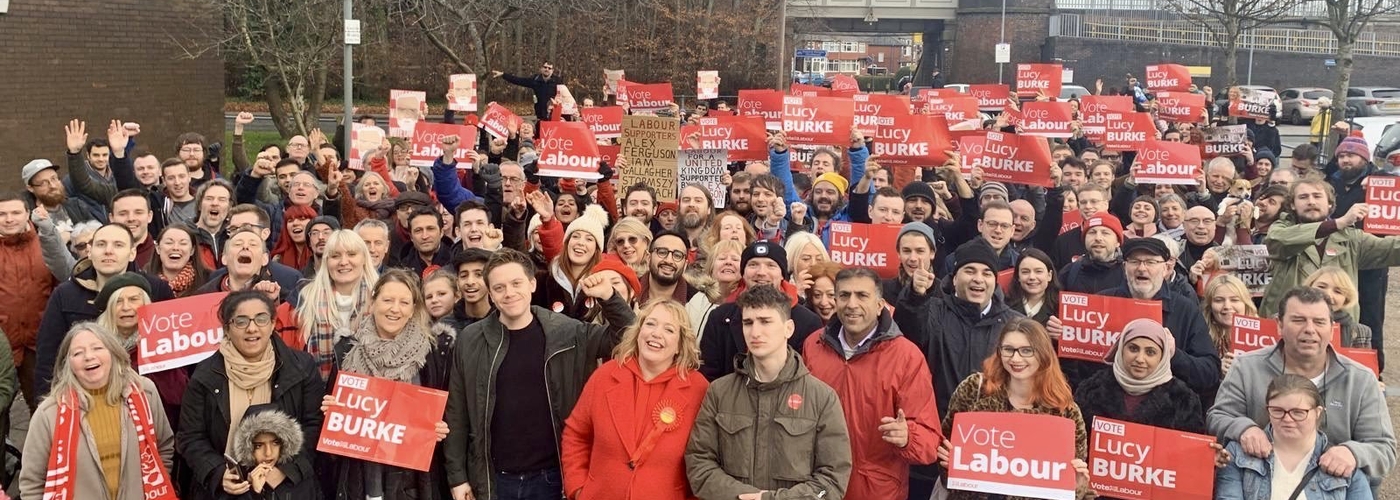Andrea Sandor hits the pavement with Labour canvassers to find out
I’ve spent the past week with Labour canvassers in Bury South, a marginal seat that could swing from Labour to Tory after 22 years. The former Labour minister, Ivan Lewis, quit the party after being suspended for alleged sexual misconduct and is running as an Independent. He made headlines again last week when he urged voters to support the Conservatives, although he’s kept his name on the ballot paper.
Canvassers stay positive and try to move the conversation on, while privately blaming the media for Corbyn’s image
The new Labour candidate is Lucy Burke. She lives in Prestwich, is a mother of two, and has spent her career working in higher education as a lecturer and researcher. While she’s been involved with the Labour party since she was 14, this is the first time she’s running for office.
“The era of the slick politician in a suit is coming to an end,” she says, “We need diverse voices and perspectives in politics - people with different experiences.”
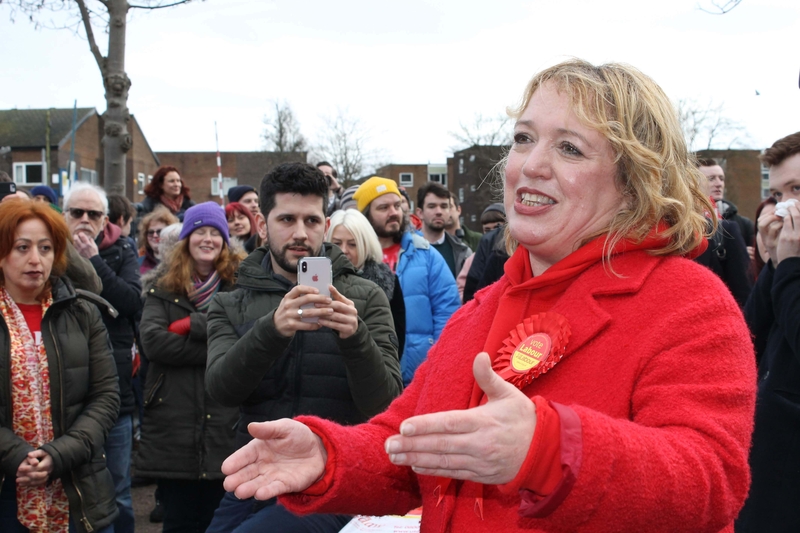
Lucy’s motivation for running is her son, who has Autism and a severe learning disability. Last year, she wrote a moving article for the Guardian, detailing how people with learning disabilities have a significantly reduced lifespan. She wrote: “The majority of these early deaths are avoidable, and include respiratory and circulatory problems, and are the consequence of entrenched inequalities in access to healthcare, and appropriate care and support.”
I first meet Lucy at a Wednesday morning door knocking session in Radcliffe. “I don’t want to live in a world that places so little value on my son’s life,” she says. She believes a society that values the lives of those with disabilities will be a better society for all.
Despite having a replacement knee last year and stage 4 osteoarthritis in her other knee, Lucy’s been out door knocking three times a day nearly everyday. She’s said it’s the physically hardest thing she’s ever done "but it’s worth it.”
Lucy has been joined by dedicated groups of Labour activists; while many are local, many others have travelled from across Greater Manchester to help Lucy win.
“We’ve been relentless,” Lucy says, “Everyday, three times a day. The people and level of support have been amazing.”
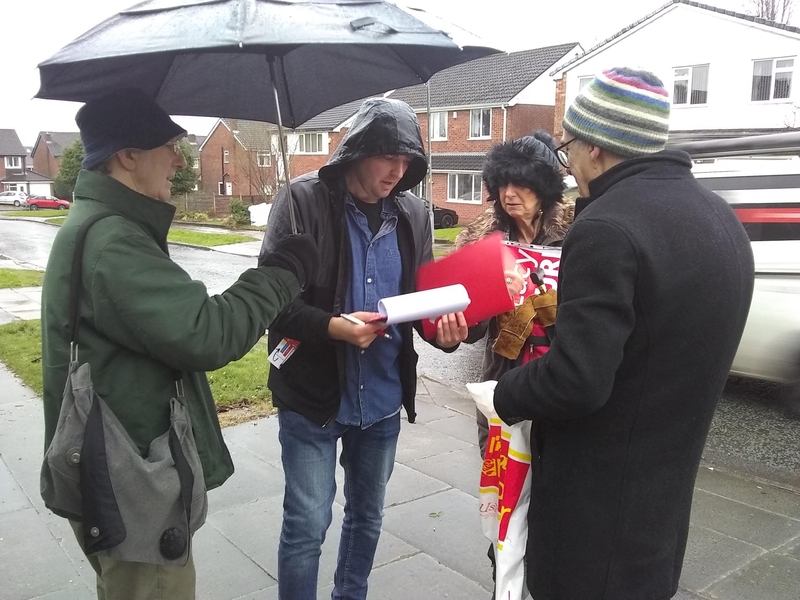
Canvassing is a curious business. You meet a group of strangers somewhere you may have never been before. You then break into small groups of five and pile into a stranger’s car and drive to an unfamiliar neighbourhood. You do this to knock on strangers’ doors in the hopes they’ll talk to you about politics. Many doors won’t open, and sometimes they’ll close as soon as you say hello. But sometimes the door stays open and you chat about the state of the nation.
For every person we speak to who supports Labour, it feels like there’s someone who doesn’t or is undecided.
Joan is in her sixties and uses a cane due to her chronic sciatica pain. Nevertheless, she’s been out door knocking nearly everyday. I follow her to a door, which is opened by a man in his fifties.
“My father was a long-time member of the Labour Party, and I’ve always voted Labour, but I can’t do it this time,” he says, “There are only two options, and I shouldn’t be in a position where I can’t choose either, but I can’t - so for the first time I’m not voting.”
Joan asks what issues are important to him and finds some common ground when he agrees some industries should be nationalised - but not all, he feels. Moreover, he’s worked hard to start and build a business and is concerned Labour’s socialist policies won’t benefit people like him. “I’m sorry but you’re not going to change my mind,” he says.
They’ve been chatting for 10 minutes and, before she turns to leave, Joan says with a wry smile, “Well can I just say, I think your father was more sensible than you.” They both laugh and wish each other well.
Many of the encounters I observe on the doorstep end like this, with a smile and a feeling of goodwill. It’s what the Labour activists are counting on.
“Nationally it’s looking tight, and I feel it’s all to play for,” a young canvasser in her twenties tells me, “I recently read that up to a third of people make up their mind in the last week, so all effort and every conversation counts!”
They’re hoping that a positive encounter with a Labour activist could nudge a floating voter over the line. While historically Labour have the door knocking edge, this election Momentum are reported as being particularly effective at mobilising a groundswell of canvassers both nationally and regionally.
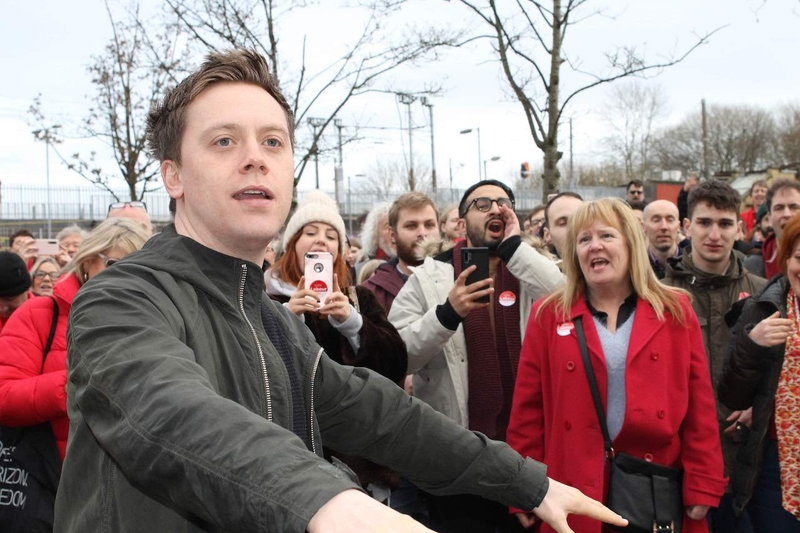
In Radcliffe I join Billy, a ‘Labour Legend’ who has given up two weeks of work to dedicate to campaigning. He speaks with a woman who hides behind her door, open just ajar, telling him she’s scared to leave her house because of the knife crime. She says she won’t be voting Labour because “I don’t like Jeremy.”
It’s a common refrain, far more common than anything to do with Brexit. At the door, canvassers stay positive and try to move the conversation on, while privately blaming the media for Corbyn’s image.
This past Saturday, Andy Burnham and Guardian journalist Owen Jones came to Bury South to rally canvassers. I asked both what they say when someone says they don’t like Corbyn.
“Remind them they don’t have to live with him,” Owen tells me, “Then get them onto policies.” Similarly, Andy Burnham suggests talking about the homelessness crisis. Earlier he rallied canvassers by asking how amazing it would be to have a Prime Minister who prioritises ending homelessness.
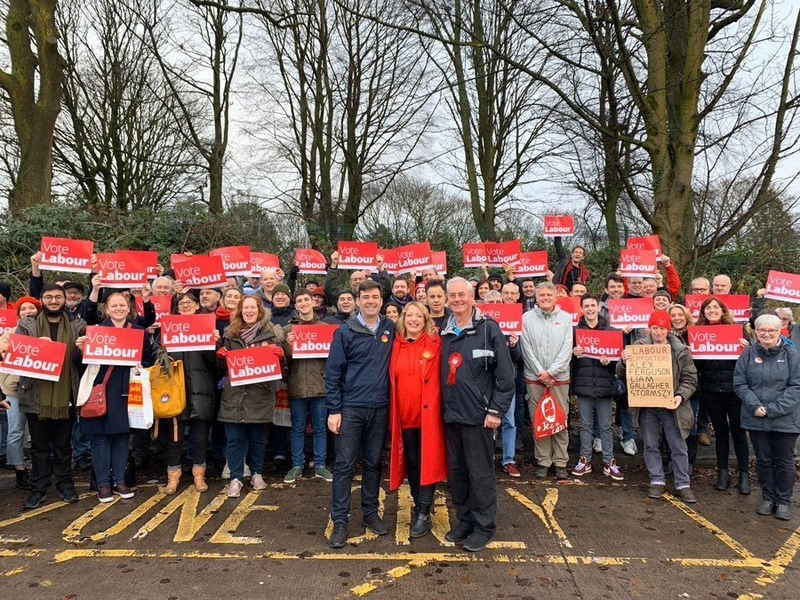
In Bury South, concerns around anti-semitism are particularly pronounced because the ward has one of the largest Jewish populations outside London.
When I speak with Lucy Burke about this, she’s visibly distressed. “You can’t tell someone how they should feel. You have to take it seriously, and I’m keen to be sensitive and acknowledge there’s a problem. I’m extremely grateful for how respectful Jewish people I’ve spoken to have been and that they’ve expressed their fears and concerns because I know how difficult that is.”
Daniel is a mental health nursing student, first-time canvasser and Jewish. While door knocking we run into someone he knows from the Jewish community. “You should vote for Jeremy Corbyn!” Daniel says laughing, walking over to his friend who’s getting out of his car. His knows his friend disagrees but they’re both smiling and glad to see each other.
“I’m Jewish and I cannot vote for Jeremy Corbyn,” Daniel’s friend tells our group of canvassers, “My parents have both voted Conservative for the first time, but I can’t vote for Boris so I’m staying out of it.” He and Daniel promise to catch up soon for a game of snooker and we depart.
As we walk away, I ask Daniel how he feels about Corbyn. “He’s a humanitarian,” Daniel says, he doesn’t believe he’s anti-semetic. So what does Daniel say to Jewish friends and family who believe he is? “That’s very difficult,” he says, “There are two very different narratives.”
That’s at the crux of the matter. There are different narratives, underpinned by different sets of statistics and gut instincts. In such a divided country, a win on the doorstep is having a constructive conversation and parting with a smile. Maybe we shouldn’t wait for an election to be doing this, maybe we need to find ways to have these kinds of face-to-face conversations everyday.
Lucy also feels something special can happen on the doorstep. “There are moments when the anger subsides and there’s a human interaction.”
But will it be enough to keep Bury South red? Lucy has her work cut out for her. She will try to reach each home marked as ‘undecided’ by a canvasser before Thursday. Until then, it’s indeed all to play for.





